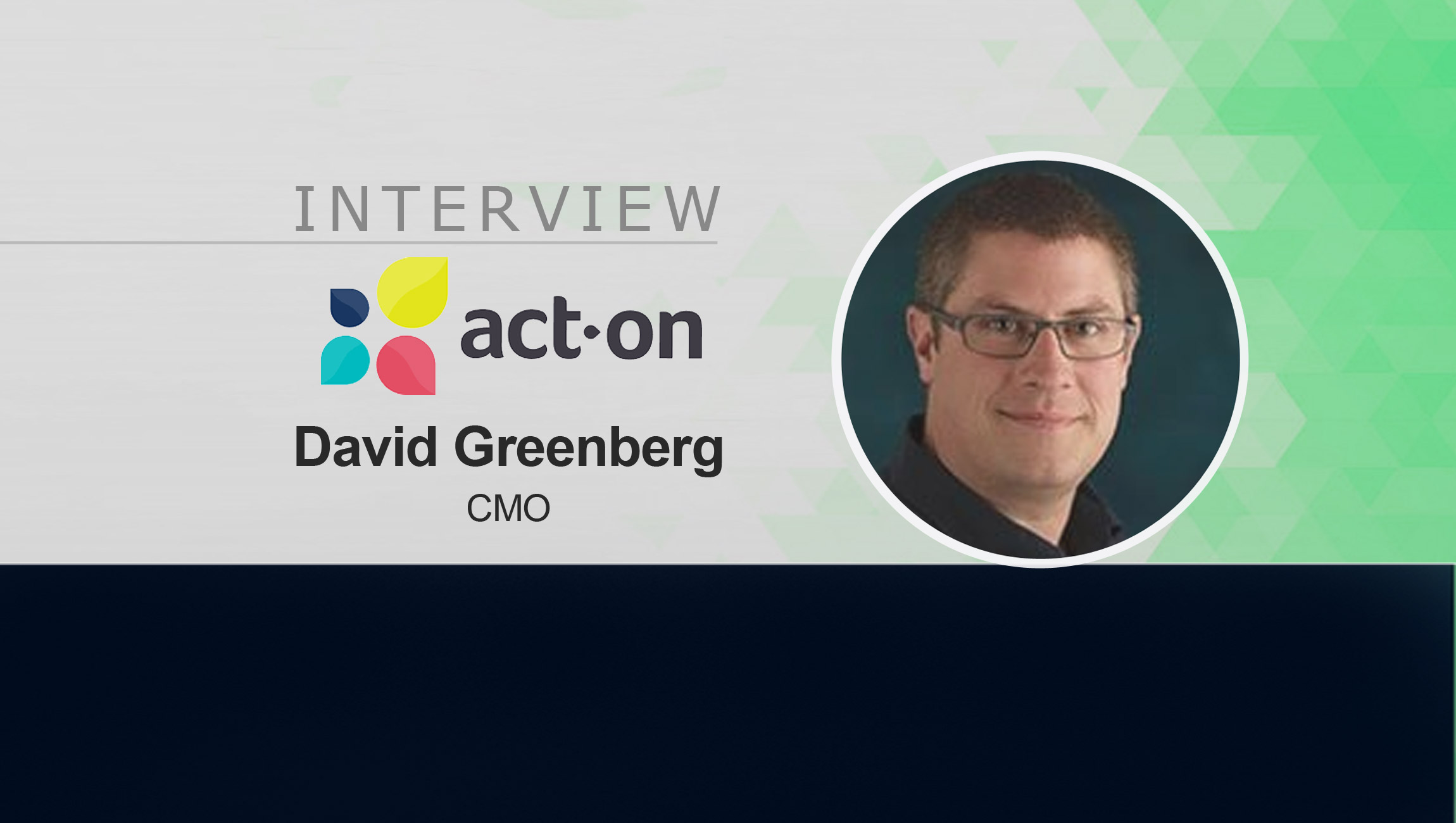Every marketer today needs to adopt a hyper-focused strategy to create a seamless customer experience, but this can’t happen without the right martech, David Greenberg, CMO at Act-On shares a few of his top martech adoption and marketing thoughts in this QnA: _______ It has been a challenging, uncertain year and Act-On is not exempt from that. We met the adversity head-on and doubled down on the belief that growth marketing automation is the future of our industry. The pandemic reinforced our belief that companies need to be strategic in their messaging by not only personalizing customer experiences through the entire lifecycle, but showing empathy and value to customers in a difficult time. We also had the opportunity to accelerate our digital tools, further aiding in our progress. Our confidence in marketing automation was rewarded by a fresh funding round this March, which empowered us to hire new staff and expand our offerings. Marketing Technology News: MarTech Interview with Dmitri Lisitski, Co-founder and CEO at Influ2 First off, I’d like to make the distinction between traditional SMS and the automated SMS marketing channel we launched. Most solutions on the market are bolted-on, glorified spam tools that simply allow marketers to send batch-and-blast mass texts. What we introduced is a SMS channel backed by the full powers of automation. This means our marketers can leverage SMS as a primary channel all on its own. With behavioral data, segmentation, and deep reporting, this newly introduced channel provides a seamless customer experience, all managed within Act-On’s main automation platform. Now let’s dive deeper into the benefits this channel poses for the modern marketer. It’s no secret SMS boasts high open rates (analyst reports go as high as 98%), giving marketers an opportunity to provide timely, direct, and relevant communications. When a message must get through, mobile has more than proven itself as a clutch channel. Adding automation capabilities to the mix adds the personalization to the channel that customers crave. This personalization also differentiates SMS from other marketing channels such as email. Because it is more direct and timely, marketers need to ensure they are using it thoughtfully and respectfully to truly deliver a great experience. At the end of the day, SMS isn’t about sending batch-and-blasts because you have a higher open rate advantage. It’s about providing value at the right time and right place. This feature isn’t just about promoting flash sales, it’s about sending messages at the right time, to the right person, when and where it matters most. For example, if you’re headed to your hotel, getting your room code minutes before check-in time via SMS is preferred over email. Or if you’re due to pay the next installment on your couch, getting a SMS payment reminder a couple of days early can make all the difference in preventing a late fee. It’s this kind of timeliness that means the world to today’s consumers. We launched our new, industry-leading SMS automated marketing product as a way for businesses to communicate with their customers and improve customer experiences. The tool allows marketers to send personalized messages to their customers, and provide information that is important, relevant, and beneficial to their day-to-day lives. We aren’t looking to just provide mobile alerts, we are empowering growth-minded marketers to reach their audiences in a dynamic, powerful way. In terms of future product innovations, we are using funding to continue to build out our platform.. Since martech is an ever-evolving landscape, our team prioritizes updating our platform to better serve the needs of modern marketers. We aren’t afraid of change and are dedicated to meeting the moment with the best possible tools and resources for our end-users. For example, during the pandemic, we introduced a slew of new product upgrades to support the move to digital. These upgrades included a new, highly-visual Automated Journey Builder to closely track the customer lifecycle, and a best-in-class Zoom integration to host webinars and other virtual events in lieu of social distancing. Looking toward the future, our end-users can expect that we will continue to invest in multichannel and a world-class user-experience. We will also continue to index on behavioral data as the most important marketing segmentation component. We are working alongside a generation of marketing pros that want to love the tools they use. UX for the marketer is just as important as CX for the customer. Innovators looking to push the marketing automation industry forward need to hyperfocus on striking this balance. That is, if your tool isn’t fun and easy to use, why would you expect the customer experience to be memorable? It’s imperative that the tool serves the user. You want marketers to be excited to log-in and seize the day. From the customer side, there is an ever-emerging expectation for an engaging experience on every channel, and marketers who create meaningful experiences at every touchpoint will come out on top. As we innovate in marketing automation, this need for seamless, cross channel engagement needs to be reflected and capitalized on. Consumers don’t want to experience the same brand differently on social media than they do its website. They want to hear a clear, unified voice no matter where engagement takes place. This builds trust and drives loyalty. Period. Additionally, I expect automation will be utilized in post-purchase to deliver great experiences beyond just the sales lead and will serve as a key tool to encourage product engagement. Overall, an increase in the use of marketing automation technologies will be prevalent throughout the entire sales funnel, not just at any one touchpoint. Marketing Technology News: MarTech Interview with Ramon Kania, Chief Technology Officer at Mitto Every marketer is hyper-focused on creating a great customer experience. But without the right tools, it can be challenging to thoroughly track customer engagement throughout the entire lifecycle. For this reason, I have to reiterate the importance of a technology like marketing automation in today’s market. I believe a marketing automation platform should be at the center of a company’s martech stack. These platforms help to centralize data, syncopate, and automate, in a way that ensures customers get the best treatment. From engagement scoring (assessing a leads’ intent based firmographics data and behavioral cues), intelligent follow-ups (Informed actions based on behavior, which automatically allow marketers to optimize timing, messaging, and offline contact), and nurture campaigns (the ability to send different, customer-centered, follow-up communications personalized by how a prospect interacts). The right marketing automation tool will manage your leads on its own, based on their data and digital body language. If you’re trying to grow your prospects while simultaneously continuing to evangelize your most loyal customers, there’s no martech solution that compares to the holistic benefits of marketing automation. Marketers will focus more on data to deliver value. Focusing on data that measures engagement at every stage of the customer lifecycle, also known as prospect engagement, is crucial. From identifying the most qualified and relevant prospective customers, to leveraging incoming engagement data to shape campaigns, monitoring what works and what doesn’t is no longer a “nice-to-do”, but an essential. When you measure and foster prospect engagement, you show that you’re listening to the needs of your audience. Marketers are increasingly moving away from simply measuring leads and dollar-to-dollar transactions, and this trend isn’t showing any signs of stopping.. Marketing will go beyond the lead, and act with more agility than ever before. Because marketers are investing in technology that supports the entire customer lifecycle and provides more automation capabilities than ever before, they can be nimble and maximize the use of their budgets and teams. This helps them to better compete in their respective market as they scale, without compromising customer experience (CX). As we look to the future, marketing automation will continue to serve as an extension of the team by automating communications and removing manual labor from day-to-day marketing tasks. Marketers will revisit the basics. As marketers look ahead, they will continue to use technology that has a proven impact. Smart, tried-and-true behavioral marketing solutions, like marketing automation, will continue to be leveraged for their clear and unparalleled ROI. Trendy technologies like AI will need to prove their relevance in martech before marketers take the plunge. Seamless relationships with sales are key. It has been said before, but it is immensely important that the marketing team has a direct relationship with your sales team because you should never just hand off your leads to sales and clock out. Your customers can become your strongest advocates, so you need to ensure that they have a great experience throughout the entire customer lifecycle. Keeping it simple is hard, but important. Earlier in my career, I thought I needed to show off everything we were doing to customers. It took me a long time to realize that this was often less impactful than when I focused on highlighting fewer, high-quality actions that were directly related to their needs. To avoid burnout, prioritize work-life balance. In a job as customer-centric as marketing, you want to be consistently putting your best foot forward. Looking out for the well-being of yourself and your teammates will keep everyone fresh and focused on driving customer experience. Marketing Technology News: MarTech Video Interview With Robert Glazer, Founder And CEO At Acceleration Partners David Greenberg is the CMO at Act-On Software, the leading growth marketing automation platform. Greenberg is a self-proclaimed brand loyalty enthusiast and brings more than 20 years of marketing leadership experience in high-growth technology organizations to the table. An early adopter of MarTech, he uniquely understands the challenges modern marketers face and strives to be an advocate and resource for growth marketers everywhere. With a firm belief that customers are more than just sales leads, Greenberg ensures all aspects of Act-On’s marketing and growth strategies are rooted in a memorable brand experience.Welcome to this martech chat David, tell us more about Act-On’s marketing journey through this still largely ongoing pandemic and some of the martech that helped drive goals during this time?
How are you seeing SMS marketing become more crucial in today’s marketing environment?
We’d love to hear more about Act-On’s latest SMS marketing feature and upcoming innovations as well!?
How do you feel marketing automation tools will evolve in the near-future and what are some of the core needs that you feel will become crucial for innovators to focus on giving users?
What are some of the core marketing technologies that you feel marketing teams should not be doing without?
A few predictions on the future of martech?
A few takeaways for marketing leaders and CMOs/CEOs in 2021: top factors they should keep in mind as they plan for the rest of the year, innovate and expand their teams?
 MarTech Interview with David Greenberg, CMO at Act-On Act-On Software offers solutions that empower marketers to move beyond the lead and engage targets at every step of the customer lifecycle.
MarTech Interview with David Greenberg, CMO at Act-On Act-On Software offers solutions that empower marketers to move beyond the lead and engage targets at every step of the customer lifecycle.
MarTech Interview with David Greenberg, CMO at Act-On

[vc_tweetmeme]
[vc_tta_tabs][vc_tta_section title=”About Act-On Software” tab_id=”1544515685282-bf64247e-9d9aeec0-8908″][/vc_tta_section][vc_tta_section tab_id=”1544515685339-cf6c9bcd-6b1aeec0-8908″ title=”About David“][/vc_tta_section][/vc_tta_tabs]
[vc_tweetmeme]











Comments are closed.